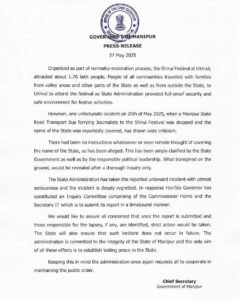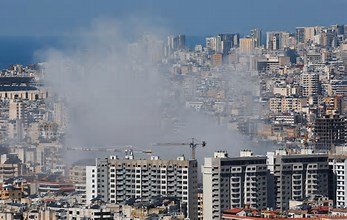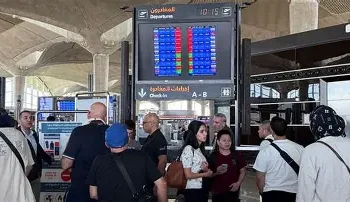Governor Ajay Kumar Bhalla has denied issuing any directive to remove the “Manipur” signage from the bus, pinning responsibility on the Army. The statement did little to calm tensions as anger mounted over what many called an attack on state pride.
BY PC Bureau
May 29, 2025 — The Indian Army’s 4th Mahar Regiment has landed in controversy after allegedly ordering the removal of “Manipur” signage from a state transport bus carrying journalists to the Shirui Lily Festival in Ukhrul on May 20. While protests have erupted across the state, the Army remains beyond legal reach—shielded by the Armed Forces (Special Powers) Act (AFSPA).
Manipur Governor Ajay Kumar Bhalla has publicly distanced himself from the signage removal, clarifying that neither Raj Bhavan nor the state government issued any such directive. The spotlight has now shifted to the Army, which, under AFSPA, enjoys legal immunity in “disturbed areas.”
Gwaltabi, where the incident occurred, falls under the Yaingangpokpi police station—one of the areas still under AFSPA’s jurisdiction. The Act, in force since 1958, empowers armed forces to use force (even lethal), arrest without warrant, conduct searches without permission, and grants them immunity from prosecution unless the central government gives prior sanction—an exceedingly rare occurrence.
 READ: Signage Row: Governor Skirts Blame, Army Dragged into Debate
READ: Signage Row: Governor Skirts Blame, Army Dragged into Debate
The Army has not officially explained its rationale, but sources suggest the signage may have been covered to avoid stoking tensions in Kuki-dominated areas along the Imphal–Ukhrul route. Earlier, a Kuki student leader had reportedly warned against Meiteis attending the festival.

The move, however, backfired. Around 20 journalists traveling in the Manipur State Transport (MST) bus, arranged by the Directorate of Information and Public Relations (DIPR), were forced to halt at the Gwaltabi checkpost, about 25 km from Imphal. Personnel from the 4th Mahar Regiment and the BSF allegedly ordered DIPR staff to cover “Manipur State Transport” on the bus windshield with white paper. Angered by the delay and what they saw as an insult to Manipur’s identity, the journalists returned to Imphal, abandoning their coverage.
The incident sparked widespread outrage, led by the Coordinating Committee on Manipur Integrity (COCOMI), a prominent Meitei civil society group. Protests intensified, with demands for the resignation of Chief Secretary P.K. Singh, Security Advisor Kuldiep Singh, and DGP Rajiv Singh.
On May 28, Chief Secretary Singh issued a statement on behalf of the Governor’s office, denying any state involvement: “No instruction was given from the Government to remove ‘Manipur’ from the bus carrying journalists en route to Shirui Lily Festival at Ukhrul.” The clarification pointed squarely at Army personnel manning the checkpost.
 READ: DOGE Drama Ends: Musk Leaves with Scars and Scrutiny
READ: DOGE Drama Ends: Musk Leaves with Scars and Scrutiny
Meanwhile, a 48-hour bandh paralyzed the Imphal Valley, with protesters locking government offices and defacing signboards—including those of the Geological Survey of India. A 5.5-km human chain protest from Imphal airport to Keishampat turned violent on May 25, resulting in eight injuries after security forces deployed tear gas.
Far from being a celebration of unity, the 5th Shirui Lily Festival has become a flashpoint for renewed ethnic and political tensions in Manipur. Critics argue that AFSPA’s blanket immunity only deepens mistrust and fuels calls for its repeal—especially when it shields actions perceived as affronts to regional identity.














